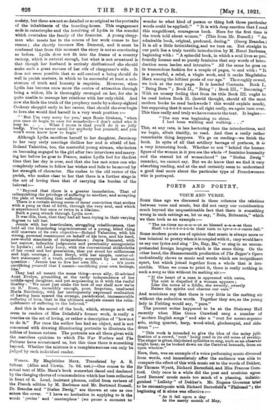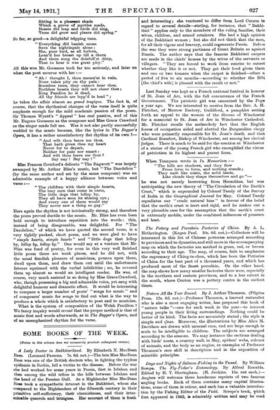POETS AND POETRY.
VOICE AND VERSE.
Some time ago we discussed in these columns the relations
between verse and music, but did not carry our consideration much beyond the unquestionable fact that there is something wrong in such settings as, let us say, " Rule, Britannia," which we then took as an example :—
" The na-tions no-o-o-o-ot so blessed a-a-a-as thou Shall i-i-i-i-i-i-i-i-in their turn to tyr-r-r-r-rants fall."
Some modem poets are of opinion that music is always more or
less inimical to poetry when it is coupled with it, they would have us say our lyrics and sing " Do, Ray, Me," or sing in an uncom-
prehended foreign language which is the same thing. On the
other hand, the Hammersmith production of The Beggar's Opera undoubtedly shows us music and words which are insignificant apart, but which joined together form a whole that is irre- sistible. When we come to print it, there is really nothing in such a song as this without its melting air :—
" If the heart of a man is oppressed with cares, The mist is dispelled if a woman appears ; Like the notes of a fiddle, she sweetly, sweetly Raises the spirits and charms our ears."
And musicians say that there is very little in the melting air without the seductive words. Together they arc, as the young lady in Fielding would say, " pure."
The present writer happened to be at the Steinway Hall recently when Miss Grace Crawford sang a number of " modern English songs " and also a " rout for mezzo-soprano solo, string quartet, harp, wood-wind, glockenspiel, and side- drum " :-
"This work is intended to give the idea of the noisy jolli- fication of a crowd, ' rout ' being used in its old sense of revelry. The singer is given disjointed syllables to sing, such as an observer might hear, as he looked down on the Carnival beneath, from an open window."
Here, then, was an example of a voice performing music divorced from words, and immediately after the audience was able to compare the effect of this with music set to the words of Dekker, Sir Thomas Wyatt, Richard Bamefield, and Miss Frances Corn- ford. Only once in a while did the poet and musician agree. Lord Bemers' muaio made too much of a pleasing, indistin-
guished " Lullaby " of Dekker's. Mr. Eugene Goossens tried to be onomatopoeic: with Richard Barnefield's "Philomel"; the beginning of it alone was effective :—
" As it fell upon a day In the merry month of May, Sitting in a pleasant shade Which a grove of myrtles made, Beasts did leap and birds did sing Trees did grow and plants did spring."
So far, so good—a delightful tripping tune.
" Everything did banish moan Save the nightingale alone : She, poor bird, as all forlorn, Lean d her breast up till a thorn And there sung the dolefull'st ditty, That to hear it was great pity."
All this woe Mr. Goossens took far too seriously, and later on when the poet mourns with her :— " Ah t thought I, thou mourn'st in vain, None takes pity on thy pain : Senseless trees, they cannot hear thee, Ruthless beasts they will not cheer thee ; King Pandion he is dead, All thy friends are lapp'd in lead" ;
he takes the affair almost au grand tragique. The fact is, of course, that the rhythmical changes of the verse itself is quite emphasis enough for the mild academic passion of the poem. Sir Thomas Wyatt's " Appeal " has real passion, and of this Mr. Eugene Goossens as the composer and Mies Grace Crawford as the singer made full use. Was it not also partly successfully wedded to the music because, like the lyrics in The Beggar's Opera, it has a rather unsatisfactory flat rhythm of its own ?-
" And wilt thou leave me thus, That hath given thee my heart Never for to depart, Neither for pain nor smart : And wilt thou leave me thus ? Say nay Say nay "
Miss Frances Cornford's delicate "The Ragwort" was largely swamped by Mr. Arthur Bliss's music, but " The Dandelion " (by the same author and set by the same composer) was an admirable example of a happy alliance between voice and
verse :— " The children with their simple hearts, The lazy men that come in carts, The little dogs that lollop by, They all have seen its shining eye ; And every one of them would say They never saw a thing so gay."
Here again the rhythm is not intrinsically strong, and therefore the poem proved ductile to the music. Mr. Bliss has even been bold enough to introduce repetition into the words : this, instead of being disagreeable, was delightful. For " The Dandelion," of which we have quoted the second verso, is a very tightly packed, short poem, and we were glad to have " simple hearts, simple hearts" and " little dogs that lollop by, lollop by, lollop by." One would say at a venture that Mr. Bliss was fond of poetry, for even in this very well finished little poem there are weak places, and he did not, with the usual fiendish pleasure of musicians, pounce upon these, dwell upon them, and draw them out until the unfortunate listener squirmed with the verbal infelicities ; no, he covered them up almost as would an intelligent reader. He was, of course, very much assisted in so doing by Miss Grace Crawford, who, though possessing a big and admirable voice, yet sang with delightful humour and dramatic effect. It would be interesting to compare a larger number of poets' " songs for music " and of composers' music for songs to find out what is the way to produce a whole which is satisfactory to poet and to musician.
What is the system of composition of the Welsh Penillion ? We fancy inquiry would reveal that the proper method is that of music first and words afterwards, as in The Beggar's Opera, and of an unemphaaized rhythm for the verse.



































 Previous page
Previous page